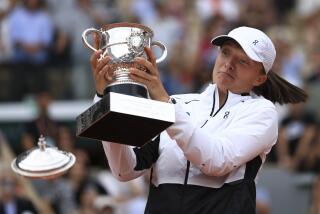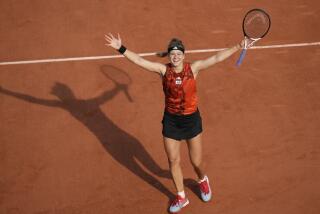Moya Returns to Fast Track With Trip to Semifinals
- Share via
NEW YORK — Carlos Moya arrived with one Grand Slam title and no confidence.
That may seem hard to believe. The telegenic Spaniard broke through at the French Open, winning the final in straight sets. His potential on the summer hard-court circuit appeared unlimited because he had reached the Australian Open final in 1997, showing he was not a mere clay-court specialist.
But then Moya lost five of six matches leading into the U.S. Open, including a momentum-killer on Long Island, falling to someone named David Prinosil of Germany. Prinosil, ranked 72nd, scraped into the Hamlet Cup as a lucky loser and dispatched Moya in the second round, losing only four games.
Which is why Moya’s modesty on Thursday was understandable. After reaching his first U.S. Open semifinal--thoroughly dismantling Magnus Larsson of Sweden, 6-4, 6-3, 6-3, in the quarterfinals in an hour and a half, committing only 15 unforced errors--he was asked the typical questions.
Did Moya come here thinking he could win?
“No,” he said.
Not at all?
“No,” he said. “Because lately I was not playing well. Actually, I was playing bad. I had a few losses against players with much lower ranking than mine, which made me think how I’m going to do here. I never know what to expect from myself.”
Moya will play Mark Philippoussis of Australia in Saturday’s semifinals. Philippoussis defeated Thomas Johansson of Sweden, 4-6, 6-3, 6-7 (7-3), 6-3, 7-6 (12-10), in a three-hour 26-minute quarterfinal.
“I think it was even worse than watching,” Philippoussis said of playing the fifth-set tiebreaker. “I got some good first serves in and kept the pressure on when I needed it. No one is going to remember the loser in this one.”
Johansson saved two match points in the fifth-set tiebreaker before Philippoussis finished it off on the third with a service winner. Philippoussis himself saved three match points in that tiebreaker.
“He served huge,” said Philippoussis, who had 30 aces of his own. “I had so many chances on break points. I think we both wanted to take it. But I think we both got too tight.”
The 21-year-old, called “Scud” because of his explosive serve, knows he will have to raise his level of play in the semifinals.
“[Moya] is not going to miss a shot,” he said. “I am going to have to play even better tennis to beat him.”
If Philippoussis’ presence in the semifinal was a surprise, Moya’s arrival was no certainty. In the second round he survived three match points in five sets against Michael Chang and in the third round rallied in the fifth set against another American, Jan-Michael Gambill.
By the time he faced his friend and countryman Alex Corretja--a rematch of the French final--Moya was feeling quite comfortable on hard courts. He fought off two set points in the first set and won fairly easily in the fourth round, 7-6 (7-4), 7-5, 6-3.
“If you tell me at the beginning of the week that I am going to be in semifinal, I would say, ‘You’re crazy.’ ” Moya said. “Even if you tell me I’m going to beat [Michael] Chang because I was playing so bad, I had no confidence at all. I thought I cannot beat anyone the way I was playing.
“But the luck started to change in the match against Chang,” he said. “There I realized that I’m doing better than I think. I saved those few match points and it made me trust myself more.”
Now, does he prefer clay courts or hard courts?
“Depends,” said Moya, smiling. “If you ask me right now, I prefer hard. If you ask me two weeks ago, I prefer clay.”
More to Read
Go beyond the scoreboard
Get the latest on L.A.'s teams in the daily Sports Report newsletter.
You may occasionally receive promotional content from the Los Angeles Times.











